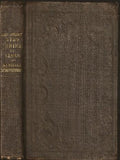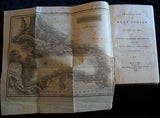Emancipation in the West Indies: A Six Months' Tour in Antigua, Barbadoes, and Jamaica in the Year 1837
Author: Thome, James Armstrong (1813–1873) and Joseph Horace Kimball
Year: 1839
Publisher: The American Anti-Slavery Society
Place: New York
Description:
i-[xx]-21-412 pages with large fold out frontispiece map and index. Small octavo (7 3/4" x 5") bound in original publisher's blind stamped decorative gray cloth with gilt lettering to spine. Second edition.
James Thome was the son of a Kentucky slaveholder. But, from early on, he harbored uneasy feelings about slavery, and in 1834, that uneasiness turned to unqualified abhorrence when as a theological student he attended an extended debate on the morality of slavery. Soon Thome was serving as a traveling agent for the American Anti-Slavery Society, and by 1837, he and a companion, Horace Kimball, were conducting a study for the society on the results of slave emancipation in the British West Indies. In the report on this trip, Emancipation in the West Indies, Thome and Kimball offered evidence that firmly refuted the prevailing belief among abolitionists that slavery could only be eliminated gradually because most slaves would need to be prepared for life in freedom. As a result, the American Anti-Slavery Society shifted from its advocacy of gradual emancipation to a demand for “unconditional freedom without delay.”
Condition:
Previous owner's neat old quill name on front pastedown; corners gently bumped; edge wear; corners and spine ends rubbed else about very good.
Year: 1839
Publisher: The American Anti-Slavery Society
Place: New York
Description:
i-[xx]-21-412 pages with large fold out frontispiece map and index. Small octavo (7 3/4" x 5") bound in original publisher's blind stamped decorative gray cloth with gilt lettering to spine. Second edition.
James Thome was the son of a Kentucky slaveholder. But, from early on, he harbored uneasy feelings about slavery, and in 1834, that uneasiness turned to unqualified abhorrence when as a theological student he attended an extended debate on the morality of slavery. Soon Thome was serving as a traveling agent for the American Anti-Slavery Society, and by 1837, he and a companion, Horace Kimball, were conducting a study for the society on the results of slave emancipation in the British West Indies. In the report on this trip, Emancipation in the West Indies, Thome and Kimball offered evidence that firmly refuted the prevailing belief among abolitionists that slavery could only be eliminated gradually because most slaves would need to be prepared for life in freedom. As a result, the American Anti-Slavery Society shifted from its advocacy of gradual emancipation to a demand for “unconditional freedom without delay.”
Condition:
Previous owner's neat old quill name on front pastedown; corners gently bumped; edge wear; corners and spine ends rubbed else about very good.









